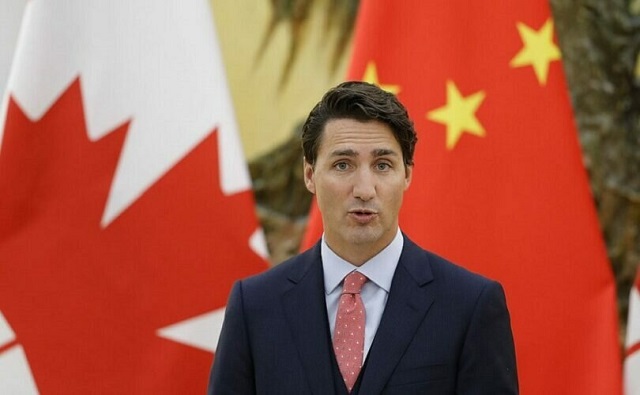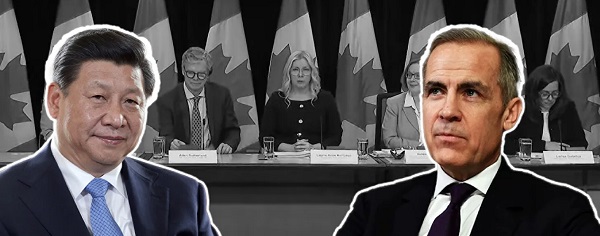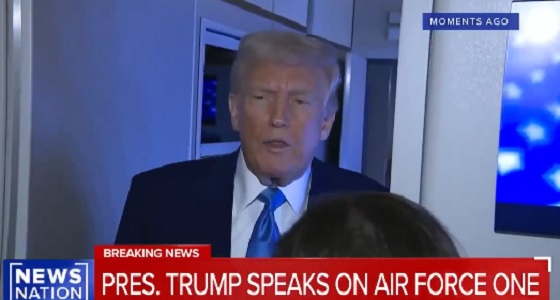espionage
Trudeau’s office was warned that Chinese agents posed ‘existential threat’ to Canada: secret memo

From LifeSiteNews
‘Until foreign interference is viewed as an existential threat to Canadian democracy and governments forcefully and actively respond, these threats will persist,’ reads the 2023 memo given to Prime Minister Justin Trudeau’s office.
Details from a “top secret” memo have shown that Prime Minister Justin Trudeau’s office was given explicit warnings by Canadian intelligence that agents of the Communist Chinese Party (CCP) meddling in the nation’s elections posed an “existential threat to Canadian democracy.”
The disclosure that Trudeau’s office was warned of CCP meddling in Canada’s elections process came during testimony last week at the Foreign Interference Commission.
Counsel for Conservative Party of Canada (CPC) MP Michael Chong observed that a “top secret” memo titled, Briefing To The Prime Minister’s Office On Foreign Interference Threats To Canada’s Democratic Institutions, dated February 21, 2023, was “truly” a “remarkable document” in what it revealed.
The six-page memo went into full detail as to the extent of CCP subterfuge which targeted Canada’s Conservative Party in both the 2019 and 2021 federal elections.
“State actors are able to conduct foreign interference successfully in Canada because there are few legal or political consequences,” reads the memo.
“Until foreign interference is viewed as an existential threat to Canadian democracy and governments forcefully and actively respond, these threats will persist.”
Trudeau has been coy and has never explicitly stated whether he was ever told by members of Canada’s intelligence agency, the Canadian Security Intelligence Service (CSIS), that the CCP agents’ actions were in breach of the nation’s Elections Act.
The Foreign Interference Commission was convened to “examine and assess the interference by China, Russia, and other foreign states or non-state actors, including any potential impacts, to confirm the integrity of, and any impacts on, the 43rd and 44th general elections (2019 and 2021 elections) at the national and electoral district levels.”
The Commission is being headed by Justice Marie-Josée Hogue, who had earlier said that she and her lawyers will remain “impartial” and will not be influenced by politics and began on January 29.
In January, Hogue said that she would “uncover the truth whatever it may be.”
Thus far, the commission has resulted in some interesting findings which are now public.
Yesterday, LifeSiteNews reported how Chong testified before the inquiry that agents of the CCP could install a premier or prime minister of their choosing by infiltrating supposedly closed party leadership races.
Last week, LifeSiteNews reported that this same memo showed that CCP agents did help to elect “pro-China” candidates after disclosing the existence of a large cash payments scheme totaling $250,000 made to so-called “pro-China” public office holders.
Trudeau in 2023 denied he was warned by security officials
Trudeau, in May of 2023, said to reporters that he did not know anything about CCP agents targeting conservative MPs.
“The Canadian Security Intelligence Service knew about certain things but didn’t feel it reached a threshold that required them to pass it up out of CSIS,” he said.
“Was it briefed up out of the Canadian Security Intelligence Service? It was not,” he said, adding that “CSIS made the determination it wasn’t something that needed to be raised to a higher level because it wasn’t a significant enough concern.”
The memo suggests that during the 2021 federal election, meddling efforts “were orchestrated or directed by the People’s Republic of China.”
The unlawful conduct included “activities aimed at discouraging Canadians, particularly of Chinese heritage, from supporting the Conservative Party, leader Erin O’Toole and particularly Steveston-Richmond East candidate Kenny Chiu,” notes the memo.
Last week, David Vigneault, who serves as CSIS director, told the inquiry that he supports the “conclusions” that the CCP was working to help elect China-friendly Canadian MPs.
Thus far, the testimony at the Commission has revealed that former Conservative Party MP Kenny Chiu said he felt “betrayed” by the federal government after only now learning he was the target of agents of the CCP.
Also, the public has learned via the inquiry from Chief Electoral Officer Stéphane Perrault that he was secretly warned by security agents of irregularities in the 2019 election.
Recently, it was revealed that Trudeau’s office knew of security warnings against one of his MPs who was helped to get elected by Chinese agents yet kept him in the party regardless.
When it comes to the CCP, many Canadians, especially pro-freedom Chinese Canadians, are concerned with the nation’s influence in what is supposed to be a democratic process.
As for Trudeau, he has in the past praised China for its “basic dictatorship” and has labeled the authoritarian nation as his favorite country other than his own.
2025 Federal Election
Election Security Briefing Confirms CCP-Linked Operation Boosted Carney


 Dan Knight
Dan Knight
While Beijing boosts Mark Carney on WeChat, federal officials downplay foreign interference, dodge accountability, and protect the very narrative propped up by the CCP.
As Canadians prepare to head to the polls on April 28, 2025, the federal government is working overtime to project an image of preparedness in the face of growing foreign interference, digital disinformation, and mounting public skepticism.
This week’s National Election Security Briefing—one in a series leading up to the vote—was framed as a gesture of transparency and reassurance. Led by Lauren Kempton, the session brought together senior bureaucrats from Canada’s intelligence, cybersecurity, and diplomatic corps. Among them: Allan Sutherland from the Privy Council Office, Vanessa Lloyd of the SITE Task Force, Bridget Walsh from the Canadian Centre for Cyber Security, and Larissa Galarza from Global Affairs.
They were joined virtually by officials from the RCMP, CSIS, and other federal agencies, forming what was presented as a united front against threats to Canada’s democratic process.
This briefing follows last week’s announcement of a new Candidate Security Program, offering private, unarmed security details to protect political candidates from intimidation. It’s a telling sign of the times—when running for office in Canada now comes with real, documented threats from foreign powers.
And if you thought foreign interference was yesterday’s problem, what came next confirmed: it’s not just back—it’s more sophisticated, more aggressive, and more deeply embedded than ever.
The WeChat Election: CCP Bots, Mark Carney, and the Digital Hijacking of Canadian Democracy
The latest federal election security briefing confirmed what many suspected but few in government are willing to say out loud: the Chinese Communist Party is actively trying to shape Canadian politics—and their current project of interest is Mark Carney.
Intelligence services revealed that a state-linked WeChat account called Youli-Youmian, tied directly to the CCP’s Central Political and Legal Affairs Commission, launched an information operation targeting Chinese-Canadian communities. The timing was not subtle. Two major spikes in activity occurred—on March 10 and again on March 25, right in the heart of the federal election campaign. The platform used was WeChat, a messaging app with over a billion users and a long record of CCP censorship, surveillance, and narrative control.
The operation focused on Mark Carney. He was the centerpiece. The content wasn’t one-sided, but it was manipulative. It praised him for being “tough” on the United States—exactly the kind of posture the CCP likes to see in Western leaders. At the same time, it seeded doubts about his experience and readiness to lead. The strategy is transparent: elevate the figure they believe will be most useful, then control the temperature of public perception around him.
The operation was not organic. Intelligence officials described it as “coordinated inauthentic behavior”—mass posting of identical headlines across outlets, bot-driven sharing, engineered engagement. This wasn’t a handful of users with strong opinions. It was algorithmic warfare.
The bureaucrats behind the briefing bent over backwards to downplay the impact. They said the campaign was “contained to one platform” and argued that Canadians have access to diverse information, so the overall electoral process remains “free and fair.” But that’s not the point. The CCP doesn’t need to control the entire media ecosystem. It only needs to shape perception where it counts—and in targeted communities, with targeted narratives, it’s clearly trying to do just that.
The Liberal Party was only briefed on the situation on April 6—after the second spike in activity. That’s weeks after the operation had already gained traction. What happened during that time? Carney’s campaign moved forward without addressing any of it. And now we know why. Whether he’s aware of it or not, the CCP sees value in propping him up—at least in the right communities, with the right messaging. If that doesn’t send alarm bells ringing, it should.
This isn’t speculation. It’s documented. It’s active. And it’s part of a larger pattern. The same interference networks have previously targeted Conservative MPs like Michael Chong, Erin O’Toole, and Kenny Chiu. They’ve gone after Chrystia Freeland too. But the recent attention to Carney marks something new—not just an attempt to tear down opponents, but to sculpt the image of a candidate who just might serve certain foreign interests, directly or indirectly.
The Chinese Communist Party doesn’t operate on party loyalty. It operates on leverage. And this operation—whether Carney asked for it or not—is a sign that Beijing believes his leadership could be shaped to their advantage.
The Canadian government can claim “no impact” all it wants. But influence isn’t always measured by votes—it’s measured by narrative, tone, and who ends up in the spotlight looking just a little more “strong” or “stable” through the right lens. Beijing’s lens.
The CCP’s Safe Bet: Mark Carney
And now, after days of playing cleanup behind a polished podium, the government rolls out a Q&A session to assure us that “nothing’s wrong,” “everything’s under control,” and that the CCP’s operation to shape the election isn’t a big deal because—get this—it only ran on one platform.
Let’s be blunt: the CCP isn’t playing to win headlines on Twitter. They’re not interested in going viral on Facebook. They’re targeting WeChat—because that’s where Chinese-Canadian voters live, talk, and form political opinions. And in that space, Beijing amplified Mark Carney—not because he’s “tough,” not because he’s competent, but because he’s good for China.
Canada has become a proxy battleground in a new Cold War between the West and the Chinese Communist Party. And Carney? He’s the CCP’s safe bet. Let’s not forget: this is the man whose financial career includes a quarter-billion-dollar loan from the Bank of China while chairing Brookfield Asset Management. The same man who’s never disclosed his full assets, despite now leading a party that’s still pretending foreign interference is just noise on the margins.
And now, in classic bureaucratic fashion, SITE and the government tell us they “don’t speculate on intent.” They claim the CCP is just sowing discord. That their approach is “party-agnostic.” That they weren’t trying to help Carney, just “pollute the digital environment.”
Give me a break. You don’t call someone a “tough opponent” to the U.S. and a “rock star” in a state-linked campaign unless you’re trying to boost their image. You don’t run coordinated bot amplification to spread content about one candidate because you’re bored and trying to “confuse people.” This wasn’t confusion. This was elevation.
And what did the government do? They flagged the content. They told Tencent about it. And then they backed off—because they don’t require any action. The PRC is running soft propaganda on a Canadian election platform, and Ottawa’s solution is: “Well, we told them. Hopefully they fix it.”
What’s worse? When asked about it directly, the government refused to name Carney as the beneficiary. They said they don’t want to “amplify the content” by repeating it. So let’s get this straight: Beijing gets to run a pro-Carney campaign, but Canadians aren’t even allowed to know the details?
That’s not protecting democracy. That’s protecting a narrative.
The truth is, Mark Carney is not being elevated because he’s good for Canadians. He’s being elevated because he’s safe for Beijing. The Liberals know it. The bureaucrats know it. And so far, no one in power has had the spine to stop it—because China’s interference benefits the very political class that claims to oppose it.
So when they talk about “safeguarding our democracy,” ask yourself: who are they really safeguarding it from? Because right now, it’s not from foreign influence—it’s from accountability.
Invite your friends and earn rewards
Catherine Herridge
FBI imposed Hunter Biden laptop ‘gag order’ after employee accidentally confirmed authenticity: report

From LifeSiteNews
Two independent journalists found that the FBI could have set the record straight by confirming the laptop was real and the subject of an ongoing criminal probe. Instead, FBI leadership allowed the false narrative about the laptop to gain momentum.
In a shocking report published on X, independent journalists Catherine Herridge and Michael Shellenberger revealed that an FBI agent accidentally confirmed to Twitter (now known as “X”) that the Hunter Biden laptop story was real less than three weeks before the 2020 election.
“For the first time, and with a change of administration, the FBI has now turned over to GOP House investigators the internal chat messages that show Bureau leadership actively silenced its employees,” Herridge and Shellenberger wrote on X.
“The FBI, which had a special task force to counter foreign election interference, could have set the record straight by confirming the laptop was real and the subject of an ongoing criminal probe,” the journalists explained. “Instead, FBI leadership allowed the false narrative about the laptop to gain momentum.”
“In 2024, an FBI official admitted to House investigators that an FBI employee had inadvertently confirmed the authenticity of Hunter Biden’s laptop to Twitter on a conference call the morning of October 14, 2020, the day the New York Post published a story about it,” Shellenberger wrote.
“I recall that when the question came up, an intelligence analyst assigned to the Criminal Investigative Division said something to the effect of, ‘Yes, the laptop is real,’” testified the then-Russia Unit Chief of the FBI’s Foreign Influence Task Force in a closed-door transcribed interview,” according to Herridge and Shellenberger. “I believe it was an (Office of General Counsel) attorney assigned to the (Foreign Influence Task Force) stepped in and said, ‘We will not comment further on this topic.’”
They recounted this exchange:
An individual whose name is blacked out, tells Elvis M. Chan, the San Francisco-based FBI special agent tasked with interacting with social media companies, there was a “gag order” on discussion of Hunter Biden’s laptop. In a separate exchange, Chan is told “official response no commen(t).”
In the chat, the FBI officials showed awareness that the laptop may have contained evidence of criminal activity.
Asked Chan, “actually what kind of case is the laptop thing? corruption? campaign financing?”
Another FBI employee responds, “CLOSE HOLD —” after which the response is redacted.
To which Chan responds, “oh crap,” appearing to underscore the serious nature of the probe, which included felony tax charges. Chan adds, “ok. It ends here.”
In the same conversation, Chan is asked if “anyone discussing that NYPost article on the Biden’s?” Chan responds, “yes we are. c d confirmed an active investigation. No further comment.” “C D” is likely shorthand for the FBI’s Criminal Division.
Said another FBI employee, whose name was redacted by the Bureau, “please do not discuss biden matter.”
It’s now common knowledge that national security agencies — including the FBI and CIA, Big Tech, and much of corporate media — colluded in suppressing truth and manufacturing lies in order to drag their preferred candidate, Joe Biden, across the finish line in the 2020 presidential election.
Incriminating evidence discovered on the laptop that Hunter Biden had long ago abandoned at a computer repair shop — reported on in two devastating pieces by the New York Post at the time — was ignored by mainstream media, fraudulently dismissed by former national intelligence officials, and essentially made inaccessible to the public by Big Tech social media sites Twitter and Facebook.
The computer contained emails showing that then-Vice President Biden had come under the influence of bad actors in Ukraine and Communist China and had used his powerful position in the Obama administration to pressure government Ukrainian officials into firing a prosecutor who was investigating the energy firm, Burisma, which was paying the younger Biden $50,000 per month to sit on its board of directors.
-

 Courageous Discourse2 days ago
Courageous Discourse2 days agoEurope Had 127,350 Cases of Measles in 2024
-

 Podcasts1 day ago
Podcasts1 day agoTrump’s Tariffs: The US, Canada, and the rest of the world
-

 2025 Federal Election1 day ago
2025 Federal Election1 day agoMark Carney Comes to B.C. and Delivers a Masterclass in Liberal Arrogance
-

 Alberta1 day ago
Alberta1 day agoProvince introducing “Patient-Focused Funding Model” to fund acute care in Alberta
-

 2025 Federal Election1 day ago
2025 Federal Election1 day agoPoilievre to invest in recovery, cut off federal funding for opioids and defund drug dens
-

 Business1 day ago
Business1 day agoTrump threatens additional 50% tariffs on China, urges ‘patience’
-

 Alberta1 day ago
Alberta1 day agoMedical regulator stops short of revoking license of Alberta doctor skeptic of COVID vaccine
-

 Business2 days ago
Business2 days agoTrump says tariffs on China will remain until trade imbalance is corrected





